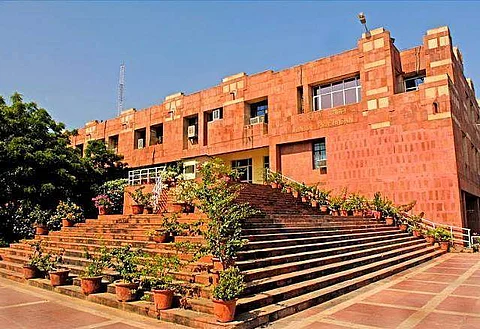

The Jawaharlal Nehru University is under fire once again. This time for trying to teach female students how to "draw a tangible line" to avoid being harassed. The varsity's Internal Complaints Committee (ICC) has organised a counselling session for students on January 17, 2022, and this is one of the reasons, the varsity thinks the session is needed. This has obviously enraged the students and has brought back the call to reinstate the Gender Sensitisation Committee Against Sexual Harassment (GSCASH) on campus.
JNU Students' Union (JNUSU) President Aishe Ghosh said that this will only make such crime rampant on campus. "The ICC time and again has passed such regressive remarks or conducted itself in a way to moral police the survivor. Such a remark creates a space where harassment in such lines will become rampant and will lead to becoming an unsafe space for women," she said.
The webpage that provides details of the counselling session on January 17, said that the ICC will introduce monthly counselling sessions for students as the ICC of JNU has "a zero-tolerance policy towards any kind of sexual harassment which take place in its sprawling campus". Then comes the question — Why is this counselling session required? In answering this the ICC said that it's necessary to refresh the students' memory on what is sexual harassment and thus the sessions will be monthly. Well and good. then comes the next two points. "Boys generally cross (sometimes advertently, sometimes inadvertently) the thin line between friendship’s bantering and sexual harassment," read the second point. " Girls are supposed to know how to draw a tangible line (between them and their male friends) to avoid any such harassments," added the last point.
The JNUSU's GSCASH representative and former JNU student Anagha Pradeep said that the current notice and statements put out by the ICC are nothing but attempts to normalise survivor blaming and patriarchal policing. "The ICC has also been in the past involved in survivor blaming and even punishing the complainant. Therefore, a lot of complainants do not approach ICC. The administration's attempt to dismantle the GSCASH has effectively led to a situation in which the university space is becoming increasingly insensitive towards gender-based issues with abusers having complete impunity," she said.
The students said that this only exposes the attitude of victim-blaming which the ICC has been allegedly practising. "This counselling session is a sham and will only lead to making JNU an unsafe space for women," said Madhurima, a student of the varsity and a member of the All India Students' Association (AISA).
The ICC also said that while the first session is already being organised, the monthly sessions will be organised when they receive more than 20 forms asking for a session.
